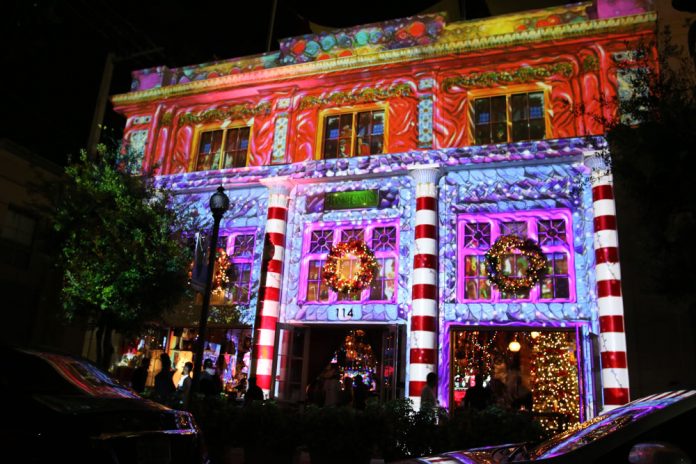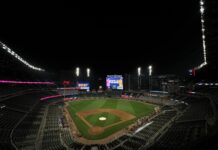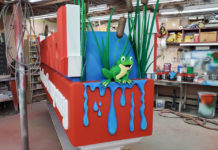It’s time to rethink projectors. In recent years projection technology has greatly advanced, which has allowed for a whole new world of applications.
“Laser technology has really reinvigorated the space in terms of less maintenance and general higher quality projection,” says Ramzi Shakra, Senior Product Manager, Epson. “With laser being the light source instead of a lamp, you get incredible brightness and outstanding image quality. And you can set the projector in such a way where you can get consistent brightness over the life of the projector.
“So it’s really worth looking at the latest laser projectors and what they can do.”
Top Technology
While projection technology has advanced, it doesn’t necessarily mean that installing or operating the projector has become more difficult. Depending on the application, projector installation should be straightforward.
“You have to be thoughtful of where you’re going to mount the projector to achieve the size of image you want,” says Shakra. “But because projectors have zoom lenses (and they can shift the entire image up, down, and sideways), you have a good amount of latitude on placement in your space.
“For even wider projector placement latitude, interchangeable lens projectors are a great option.”
Epson offers a variety of projectors, including the powerful and bright Pro-L series, which features up to eleven optional lenses and 3LCD technology that utilizes three chips to provide high color accuracy and equal white and color brightness. Epson’s LightScene is ideal for visual displays and immersive environments.
Projectors also do a better job at cutting through the visual clutter to attract attention. “People are looking at their phone, which is a screen. They go home and look at their TV, which is a screen,” says Shakra. “They almost don’t see the screens anymore. There’s just nothing interesting or new about them.
“But if they see projection on a curved surface, or projection onto a 3D object, suddenly they’re really paying attention.”
In addition, projectors allow a client to keep the integrity of their design and space intact when they’re not in use. “You can think of flat panels and LED walls as added furniture to the space,” says Shakra. “While projection actually augments the space. You can turn off the projected image, and then your space goes back to the way it was before.”
The Experience Economy
Where projectors really “shine” is in creative applications.
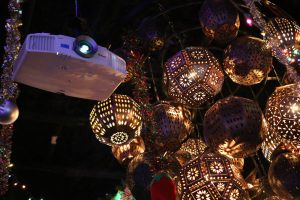
Businesses are now using projectors for everything from wayfinding to education to interactive experiences.
Because of these capabilities, projectors are uniquely positioned to meet the demands of consumers.
Banko Cantina
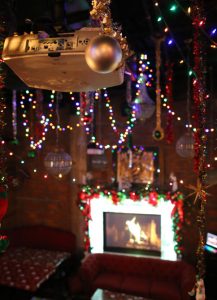 Banko Cantina, a Mexican restaurant and tequila bar in West Palm Beach, Florida, understands the importance of cultivating an experience for its patrons.
Banko Cantina, a Mexican restaurant and tequila bar in West Palm Beach, Florida, understands the importance of cultivating an experience for its patrons.
The bar/restaurant stretches across three floors in a 1921 landmark building that was the former home of the American National Bank. On the first floor is an authentic Mexican restaurant, on the second a lounge with dancing, and on the third a rooftop bar with a DJ and dance floor.
When Owner Tom Murray took over the establishment in 2018, the second and third floor lounge and rooftop bar were doing well, but he was looking to do something new that would bring more attention to the Mexican restaurant on the first floor. Hailing from Chicago, Murray remembered the way bars in the city would go over the top with their holiday decorations, and he decided to do something similar with Banko Cantina.
He contacted The Event Group, which has experience decorating large-scale organizations, and the company brought in The Electric Dream Machine to plan out projection mapping for the space.
“Banko Cantina wanted to go all out and do something really big,” says Jasper Mosher, co-founder of The Electric Dream Machine.
Mosher walked around the venue and chose artwork and existing structures to animate. “One of the great things about Banko is how much unique artwork is already painted throughout the venue,” says Mosher. “Existing structures and artwork are our favorite mediums to work with. Our process can leave a building, sculpture, or painting looking like a cartoon misplaced into a real life setting. This effect is so impactful that you just want to reach out and touch it to see if what you are experiencing is real.”
Together with a variety of real, tangible Christmas decorations, the projection mapping included images of elves and Christmas scenes on the windows, a roaring fireplace on a wall, and a painting of a woman that was brought to life with moving eyes and various Christmas imagery projected around her.
Mosher thought the outside needed some projection mapping as well. “After we had finished the inside, we proposed the outside, and the owner loved it. So we went ahead and mapped it out, and it seemed to be a pretty big hit,” says Mosher. “There was an abandoned building across the street that had the perfect empty window space to put the projectors in.”
The exterior projection mapping includes images of falling snow, colorful backgrounds, and elves in the windows.
Banko Cantina has since used projection mapping to transform the bar for Halloween, St. Patrick’s Day, and to show NFL’s biggest game of the year. Over the last two years, projection mapping led to more exposure for Banko Cantina and also a large spike in traffic. “It’s a great way to pull attention to the establishment,” says Mosher. “It just really makes it stand out from all the others.”


